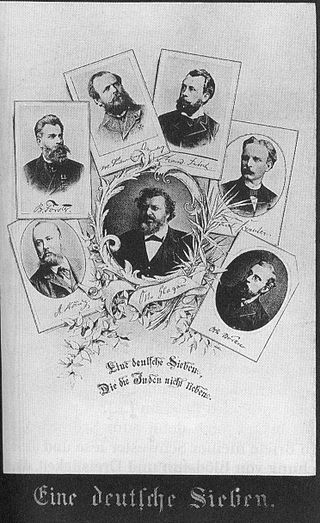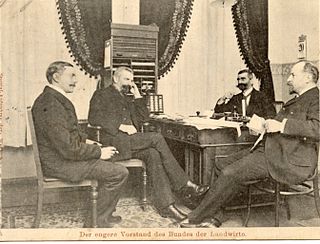Related Research Articles

The German People's Party was a conservative-liberal political party during the Weimar Republic that was the successor to the National Liberal Party of the German Empire. Along with the left-liberal German Democratic Party (DDP), it represented political liberalism in Germany between 1918 and 1933.

The German Democratic Party was a liberal political party in the Weimar Republic, considered centrist or centre-left. Along with the right-liberal German People's Party, it represented political liberalism in Germany between 1918 and 1933. It was formed in 1918 from the Progressive People's Party and the liberal wing of the National Liberal Party, both of which had been active in the German Empire.

Philipp Heinrich Scheidemann was a German politician of the Social Democratic Party of Germany (SPD). In the first quarter of the 20th century he played a leading role in both his party and in the young Weimar Republic. During the German Revolution of 1918–1919 that broke out after Germany's defeat in World War I, Scheidemann proclaimed a German Republic from a balcony of the Reichstag building. In 1919 he was elected Reich Minister President by the National Assembly meeting in Weimar to write a constitution for the republic. He resigned the office the same year due to a lack of unanimity in the cabinet on whether or not to accept the terms of the Treaty of Versailles.

The German National People's Party was a national-conservative and monarchist political party in Germany during the Weimar Republic. Before the rise of the Nazi Party, it was the major nationalist party in Weimar Germany. It was an alliance of conservative, nationalist, monarchist, völkisch, and antisemitic elements supported by the Pan-German League. Ideologically, the party was described as subscribing to authoritarian conservatism, German nationalism, monarchism, and from 1931 onwards also to corporatism in economic policy. It held anti-communist, anti-Catholic, and antisemitic views. On the left–right political spectrum, it belonged on the right-wing, and is classified as far-right in its early years and then again from the late 1920s when it moved back rightward.
The North Dakota Democratic–Nonpartisan League Party is the North Dakota affiliate of the national Democratic Party. It was formed as the outcome of a merger of two parties; the state previously had a three-party political system. It is one of only two state Democratic Party affiliates to have a different name from the central party, the other being the neighboring Minnesota Democratic–Farmer–Labor Party.

Friedrich Naumann was a German liberal politician and Protestant parish pastor. In 1896, he founded the National-Social Association that sought to combine liberalism, nationalism and (non-Marxist) socialism with Protestant Christian values, proposing social reform to prevent class struggle. He led the party until its merger into the Free-minded Union in 1903. From 1907 to 1912 and again from 1913 to 1918, he was a member of the Reichstag of the German Empire.
The Christian Social Party was a right-wing political party in the German Empire founded in 1878 by Adolf Stoecker as the Christian Social Workers' Party.

Otto Böckel was a German populist politician who became one of the first to successfully exploit antisemitism as a political issue in the country.

The Reichstag of the German Empire was Germany's lower House of Parliament from 1871 to 1918. Within the governmental structure of the Reich, it represented the national and democratic element alongside the federalism of the Bundesrat and the monarchic and bureaucratic element of the executive, embodied in the Reich chancellor. Together with the Bundesrat, the Reichstag had legislative power and shared in decision-making on the budget. It also had certain rights of control over the executive branch and could engage the public through its debates. The emperor had little political power, and over time the position of the Reichstag strengthened with respect to both the imperial government and the Bundesrat.
Friedrich Lutz was a German politician, Bavarian brewery owner, and farmer. He was mayor (bürgermeister) of Heidenheim, a member of the Bavarian Landtag and a member of the German Reichstag.

The Bund der Landwirte (BDL) was a German advocacy group founded 18 February 1893 by farmers and agricultural interests in response to the farm crisis of the 1890s, and more specifically the result of the protests against the low-tariff policies of Chancellor Leo von Caprivi, including his free trade policies.
Wilhelm Florin was a German Communist Party (KPD) politician and a campaigner in opposition to National Socialism.
Robert Neddermeyer was a German political activist and Communist politician.
The German Social Party was a far-right political party active in the German Empire.
The German Reform Party was a far-right political party active in the German Empire. It had antisemitism as its ideological basis.
The German Social Reform Party was a German Empire antisemitic political party active from 1894 to 1900. It was a merger between the German Reform Party (DRP) and the German Social Party (DSP).
Hermann Kling was a German politician.
Georg Streiter was a German politician of the German People's Party (DVP).
Paul Reißhaus was a pioneering German politician. He was the first SPD member of the national parliament (Reichstag) from Erfurt.
Maximilian von Jaunez, commonly known as Max Jaunez, was a French-German industrialist and politician. From 1903 to 1907, he served in the Reichstag of the German Empire and from 1900 to 1917, he served as the General Councilor of Volmunster. Jaunez owned and operated the Utzschneider & Ed. Jaunez ceramics factory in Sarreguemines and was the owner of the Chateau de Rémelfing.
References
- ↑ Christian S. Davis (2012). Colonialism, Antisemitism, and Germans of Jewish Descent in Imperial Germany. University of Michigan Press. p. 123, note 167.
- ↑ "Reichstagshandbuch 1903". Münchener Digitalisierungszentrum. p. 12. Retrieved 20 November 2009.
- ↑ "Reichstagshandbuch 1907". Münchener Digitalisierungszentrum. p. 413. Retrieved 20 November 2009.
- ↑ "Reichstagshandbuch 1912". Münchener Digitalisierungszentrum. p. 416. Retrieved 20 November 2009.
- 1 2 Vincent E McHale (1983) Political parties of Europe, Greenwood Press, p417 ISBN 0-313-23804-9